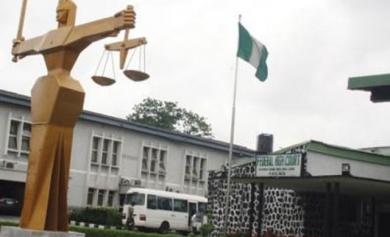
A Federal High Court in Abuja yesterday expunged Sections 140 (2) and 141 of the Electoral Act 2010, which denied the election petitions tribunals at the state and federal levels the powers to declare anybody winner in an election.
In a 68-page landmark judgement that lasted for about two hours, Justice Gabriel Kolawole held that allowing the above mentioned provisions of the Electoral Act to exist would offend and infract on the provisions of Section 285 (1) of the 1999 Constitution (as amended).
The Labour Party had filled a suit, asking the court to hold that Section 140(2) and 141 of the Electoral Act, 2010 were unconstitutional, on the grounds that the controversial sections smacked of legislative tyranny, having removed the constitutionally guaranteed powers of the court to declare a candidate the winner of an election.
The party had prayed the court to declare that sections (140[1] and [2]) were inconsistent with the provisions of sections 6(6a), 134,179, 285 of the 1999 Constitution.
The party had named the Independent National Electoral Commission (INEC) and the attorney-general of the federation as co-defendants in the suit.
The position of the Labour Party was supported by the attorney-general of the federation, as contained in a brief of argument filed on behalf of the AGF by Mrs. Olufunke Aboyade.
The said sections, 140(2) and 141, stated that, “Where an election tribunal or court nullifies an election on grounds that the person who obtained the highest votes at the election was not qualified to contest the election, the election tribunal or court shall not declare the person with the second highest votes as elected, but shall order a fresh election”.
The sections also held that an election petition or court should not under any circumstance declare any person a winner where such a person had not fully participated in all the stages of the said election.
But Justice Kolawole had further in his verdict said that if Sections 140 (2) and 141 of the Electoral Act 2010 were allowed or affirmed by the court, election petitions tribunals would have limited declarative powers, to the extent that they (the tribunals) would only be able to order re-run elections rather than declare a clear winner, even when there was the need to do so.
He said, “National Assembly has no competence to enact Sections 140 (2) and 141 of the Electoral Act 2010 because when it does, it delimits the power of the court to adjudicate disputes between two parties in election petitions. Sections 140 (2) and I41 derogate the powers enshrined by Sections 4 (8) and 6 (1) of the constitution.
“It is true that some electoral disputes extended to some few months to the end of the tenure or term of the last elected officials, but are these Sections 140 (2) and 141 of the Electoral Act 2010 out to correct the time required to determine electoral disputes? Section 4 of the constitution empowers courts on what to decide in any case.
“Once an election tribunal sits over an election petition, no legislation can curtail its inherent powers on what to decide. It just does not fit. The 1999 Constitution spells out the powers of the three tiers of government.”
In line with this reasoning, Sections 140 (2) and 141 of the Electoral Act 2010, the court stated that the constitution did not give powers to the Legislature to determine what the court should do in any matter before it, adding that “any law which is not consistent with any provision of the constitution shall be to the extent of its inconsistency null and void and of no effect whatsoever.”
He continued, “Sections 140 (2) and 141 of the Electoral Act 2010 are nothing but legislative judgement, which the National Assembly lacks powers to make. The said provisions are an usurpation of judiciary powers to do justice between parties in a dispute.
“I don’t think that the tribunals can operate effectively with these provisions. I therefore declare them unconstitutional, null and void and consequently nullified. The plaintiff’s reliefs are hereby granted and I make no order as to cost.”
The LP had in the application by its lawyer Chief Chuwkuma Ekomaru (SAN), prayed the court to declare that Sections 140[1] and [2] void, being inconsistent with the provisions of sections 6(6a), 134,179, 285 of the 1999 Constitution.
A 17-paragraph affidavit deposed to by the chairman of the party, Mr. Dan Nwanyanwu, was attached to the originating summons.

